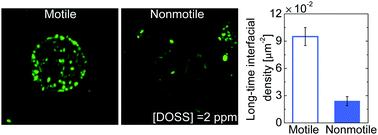Bacterial motility enhances adhesion to oil droplets†
Abstract
Adhesion of bacteria to liquid–liquid interfaces can play a role in the biodegradation of dispersed hydrocarbons and in biochemical and bioprocess engineering. Whereas thermodynamic factors underpinning adhesion are well studied, the role of bacterial activity on adhesion is less explored. Here, we show that bacterial motility enhances adhesion to surfactant-decorated oil droplets dispersed in artificial sea water. Motile Halomonas titanicae adhered to hexadecane droplets stabilized with dioctyl sodium sulfosuccinate (DOSS) more rapidly and at greater surface densities compared to nonmotile H. titanicae, whose flagellar motion was arrested through addition of a proton uncoupler. Increasing the concentration of DOSS reduced the surface density of both motile and nonmotile bacteria as a result of the reduced interfacial tension.



 Please wait while we load your content...
Please wait while we load your content...